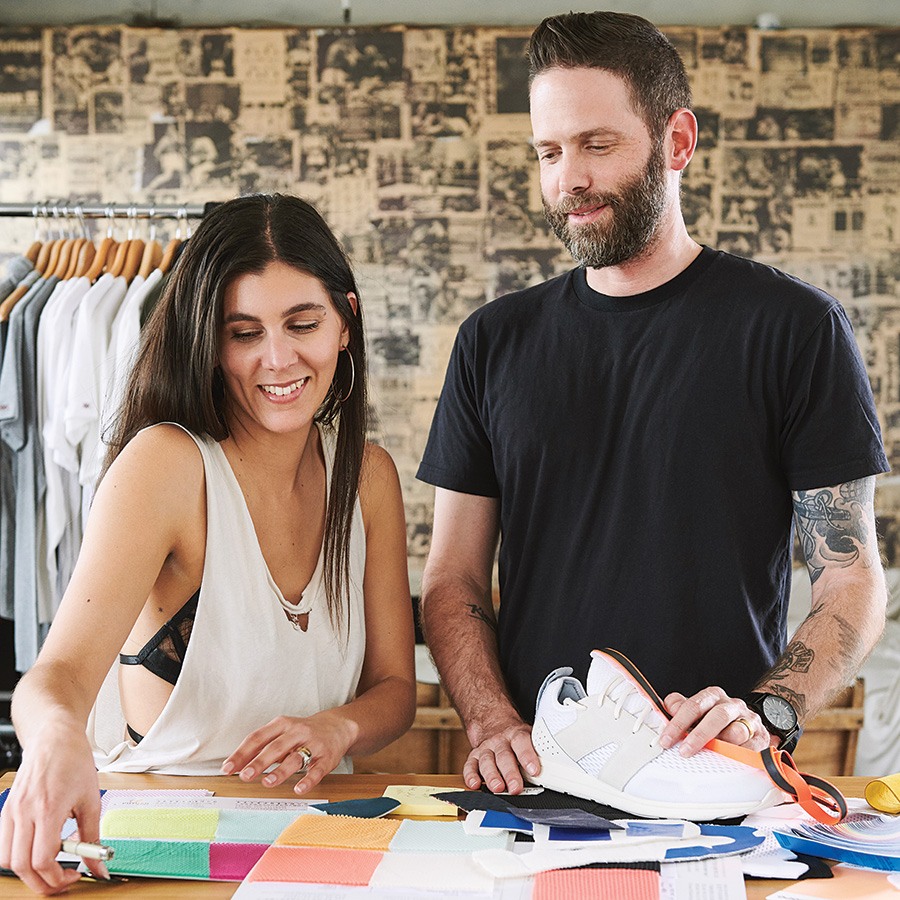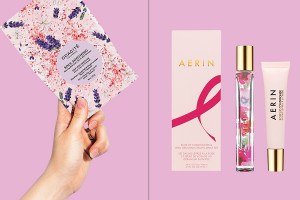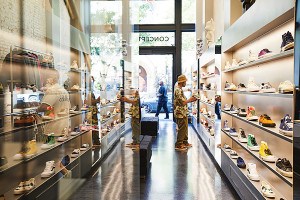The Untold Story of York Athletics: The Coolest Kicks in Town
Launching a Boston sneaker company in the shadow of Reebok, New Balance, and Converse is no small feat. Meet the bad-ass young visionaries who are just doing it.

Elizabeth and Mark McGarry check out potential new color swatches. / Photo by Karin Dailey
When I arrived at York Athletics’ South End headquarters, located in a brick building on Albany Street across from the former Boston Flower Exchange, the party was already in full swing. Artist Sam Fish, runner Chernet Sisay, and local fashion designer Erin Robertson of Project Runway fame mingled among the stylishly dressed, racially diverse, mostly under-35 crowd, while a DJ at the far end of the room supplied the soundscape. A few guests sporting skateboard style hung out with a strong contingent of hipster millennials clad in possibly ironic eyewear. Nearly all sipped beer from tall cans with artistically designed labels that seemed to have materialized out of nowhere—because I never did find the bar. If it hadn’t been for the sneaker samples displayed in the shoe company’s adjoining room, you could have mistaken it for a typical—albeit uncharacteristically cool for Boston—house party.
In the center of the room, York Athletics cofounder Mark McGarry, a sneaker industry veteran and former competitive snowboarder, held court among the samples, showing off his fledgling brand’s most popular style, the “Henry,” in the “Half & Half” black-and-white colorway, to the partygoers gathered around him. Meanwhile, Elizabeth McGarry, his wife, a fashion designer and York Athletics’ creative director, leaned against a wall near the entrance, chatting with a cluster of devotees of her and her husband’s creation.
The good news for York Athletics is that its fans extend far beyond the city’s stylish set. In the three years since launching, the company has won numerous awards and recognition from national magazines, earned a rapidly growing customer base, and cultivated a loyal following among local influencers in the art, fitness, and fashion worlds. Among their diverse brand ambassadors are Jay Kelly, a professional boxer; Marilyn Rondon, a Miami author and artist; and Russell Hakim, a singer, songwriter, and model, to name merely a few.
To be clear: Breaking into the sneaker market in a town like Boston is no easy feat. We’re already home to the global headquarters of New Balance, Converse, and Reebok, not to mention Rockport and Saucony, which have offices in the suburbs. On top of that, the city has emerged in recent years—thanks to Bodega, the streetwear mecca—as one of the best markets for limited-edition sneaker releases, meaning footwear-buyers here are sophisticated and discerning. But York Athletics’ founders weren’t daunted. Even in Sneaker Town USA, they saw a gaping hole in the market, and an underserved consumer group of independent thinkers they could claim as their own.
“There’s no challenger performance-footwear brand,” Elizabeth tells me. “You have all of the big players, and that’s it. All of them have their logos, huge on the side. They’re all the same, look the same, feel the same—all the marketing tells you that you have to be a premier athlete.” She adds that lots of people who might not consider themselves part of the mainstream simply don’t relate to these brands. What’s more, for many people she knows who are mindful of the clothes they wear, putting on a pair of “dork-ass” sneakers, even just to go for a run, feels like sacrificing their personal style.
To crack into the sneaker market and take on the juggernauts, York Athletics is changing the rules and competing in ways that the big brands are not. Their shoes are understated, unisex, come only in solid colors with no logos (save for the name “York Athletics” discretely running down the back), and are sold exclusively online. York’s target customers are as serious about their fashion choices as they are about their physiques, the kind of people who would rather wear a sneaker with little brand recognition and made by a small startup than fall for what a big corporation is hawking. In other words, the McGarrys are marketing to exactly the kind of people who were gathered at their party that night, people who are just like the company itself—underdogs challenging the big guys at their own game.
Armed with some early success, dreams of growing beyond Boston, and venture capitalists knocking on its door, the guerrilla sneaker brand is determined to kick butt. But only if its founders can answer their toughest question yet: how to go big without losing their cool.
There’s a certain irony in the fact that Mark and Elizabeth, in some ways, can thank Nike for their partnership. After all, they might not have both been living in Portland, Oregon, had it not been for jobs with the shoe titan.
Raised in Andover, Mark McGarry was a talented snowboarder who earned a spot on the team at the University of Vermont—as close to Stowe as he could get—and then moved to Mount Hood, Oregon, where he coached Olympic hopefuls at a snowboard camp owned by Vans. His slope-side interactions with Vans sparked an interest in the sneaker industry, and that led him to a job at the now-defunct shoe brand Savier, once owned by Nike. There, he worked on video production for public relations and advertising campaigns, flying around the country to collaborate with a potent mix of personalities—artists, creatives, and the professional skateboarders that he’d looked up to as a kid.
Meanwhile, Elizabeth, who grew up in Portland, Oregon, had studied fashion design in Seattle and worked for a dressmaker in Antwerp, Belgium, before returning to her hometown to help the legacy swimwear brand Jantzen relaunch. When she first met Mark through mutual friends in a Portland bar, she was working at Nike designing women’s apparel, and Mark had just left the company to start his own video production and marketing business.
Mark’s burgeoning list of impressive clients soon caught the attention of Puma executives based in Westford, who offered him a senior-level job managing their streetwear line right at a time when he was looking to get back into the sneaker industry. It was a perfect fit—in an imperfect location near Boston, across the country from Elizabeth. Mark accepted the job, and the continental divide became the ultimate test for their relationship. About a year later, in a stroke of good luck, a Reebok recruiter offered Elizabeth a job in the Hub.
As the couple began their life together on the East Coast, another ambitious twentysomething, Travis York, was making a name for himself as the president and CEO of GYK Antler, a marketing agency with offices in his hometown of Manchester, New Hampshire, and Boston. York had studied advertising at Boston University but had footwear in his blood. His parents ran a successful sporting goods store called Indian Head Athletics, which was the second iteration of a business, founded by his grandparents in 1946, that manufactured cleated footwear for professional athletes.
Mark had been college friends with York’s wife, and the two entrepreneurs got to know each other—as great minds so often do—at kids’ birthday parties back in 2012. Realizing they had a lot in common, York and Mark made plans to meet for lunch. As it turned out, Mark and Elizabeth had long nursed a dream of relaunching a local legacy brand into the e-commerce space—a space that was growing more competitive while brick-and-mortar shops struggled. “Every time we went on weekend trips,” Mark remembers, “we would talk about how cool that would be. Because it all started here, the textile industry was born here, the footwear industry was born here. We had even handpicked some brands and were planning to go out and pitch them. And then I’m at lunch with Travis and he says, ‘Did I ever tell you that my grandfather used to own a performance-footwear factory?’”
In what felt like the startup version of a rom-com meet-cute, the threesome felt the beginnings of a partnership brewing and quickly seized the moment. As a new online-only brand, they wouldn’t waste time appealing to the demands of wholesalers, big-box retailers, or specialty stores. Even better, they wouldn’t have to pump out a collection of different styles every couple of months to keep up with the demands of ever-changing trends.
Determined to differentiate themselves from the bigger shoe companies and exude their all-important rebel spirit, the team made another potentially cost-saving and also very inclusive decision that would position the brand as progressive and unique. They would manufacture only gender-neutral collections, shunning the typical approach of “pink it and shrink it” that the big footwear brands embrace, in which they design first for a man and later produce female styles that are just smaller and more stereotypically girly.
Of course, formidable barriers to entry still lay ahead before they could get off the ground: It’s expensive to create a sneaker; the retail landscape is unpredictable; and the most trusted names in performance gear were already looming large in the city’s psyche. But York Athletics’ founders believed it had all the ingredients to produce the scarcest of commodities: something cool. And more to the point, they had a clear brand story and knew exactly whom to target.
The teasers for York Athletics began appearing on social media in October 2015. I was a stylist at the time and worked on one of their photo shoots—full disclosure—so I knew what York Athletics was selling. But for those just following the oddly intriguing initial social media campaign, it wasn’t entirely clear.
Photos, mostly in black and white, showed various people—seemingly unaware of the camera—caught in the midst of some activity, which wasn’t always a workout. One image showed a middle-aged white guy wearing a York Athletics baseball hat while laughing. Another featured local professional boxer Kevin Cobbs standing next to the heavy bag mid-punch. A video clip of professional snowboarder Eddie Wall, a tattooed woman running, and a tattooed arm about to ink more tattoos rounded out the company’s campaign. It was easy to guess that this might have something to do with sportswear, although was it for running, boxing, or just looking good?
The answer, it turned out, was yes.
Four months later, York Athletics released the “Henry” sneaker, complete with a sleek silhouette, non-slip laces, and a pull-on loop at the back. In addition to on York Athletics’ website, the new shoe debuted at Bodega for a limited time, giving the brand instant street and fashion cred. Next, York sought out fitness influencers, giving shoes to trainers at the city’s most popular gyms. In turn, they introduced the shoes to their clients and sales began to climb.
Early on, York Athletics used “Out of Step” as a tag line, inspired by the iconic hard-core punk band Minor Threat, says Bodega co-owner Oliver Mak. It was a statement about not following the crowd and spoke to the long history of counterculture in Boston. In many ways, their brand image is an idealized and cooler version of the Boston stereotype itself—the gritty, hard-working New Englander with chops who tells it like it is—but has more tattoos and better style.
It didn’t take long for experts in the industry to notice, and York Athletics’ signature sneaker started racking up accolades. It won a performance gear award for best upstart brand from Men’s Health, was named one of the Best CrossFit Training Shoes of 2018 by Men’s Journal, and was featured by a handful of other national publications and sites. “Once we launched,” York says, “we started selling shoes pretty quickly.”
Today, the little performance-brand-that-could continues to gain momentum. While the company declined to share concrete data points, including sales figures, Mark did say that the sales essentially double each year. The brand is selling across the globe, counting New York, Los Angeles, and Vancouver as cities with large fan bases. Boston, however, is still its biggest market. “I love that our brand is part of the fabric of a city that is resilient and strong,” Mark says. Not only is York Athletics part of Boston, but the company plays up the Northeast, and Boston in particular, as an important part of its identity. But that may take it only so far.
Peter Verry of Footwear News told me York Athletics’ initial strong reliance on New England grit in its marketing made it hard for the brand to appeal to potential customers outside the region. When I asked Mark how far behind in sales other cities were, he hedged and merely said that Boston exceeded sales in other cities by “more than 10 percent”—but wouldn’t specify how much more. It’s safe to say that York Athletics is a hit in its own backyard, but it remains to be seen whether the rest of the country will fall in step.
To broaden its customer base, York Athletics has already shown some willingness to tweak its model and even edit its DNA. Hoping to reach sneakerheads who felt left out of the brand’s targeted audience of hipster subversives, the company recently tore an entire chapter out of the big-brand handbook by signing Olympic medalist Aly Raisman as its newest ambassador. She’s strong, she’s a fighter, she’s a rabble-rouser, and she’s also a salt-of-the-earth, relatable straight shooter from Needham—pure New England. But there is no doubt that she is a full-blown celebrity, one who has publicly stated that she is “not a tattoo kind of person.” Still, she fits the general York Athletics mold—even if you have to squint a little to see it.
So far, York Athletics has somewhat downplayed Raisman, featuring her on equal footing with other non-celebrity ambassadors, such as Barry’s Fitness trainer Kelly Whittaker and Jason Rodricks, a local dad in recovery, to continue its appeal to everyday, unsung fighters. But with the release of a Raisman-designed sneaker due out this September, she may well yet step into the spotlight.
When it comes to future growth and funding, Mark says York Athletics has declined offers to take on venture capital. The company has raised all of its money, including $2.5 million in the most recent round, through family and friends, influential funders such as Jay Bush, and even satisfied repeat customers looking for a piece of the action. Mark knows the advantages that VC money could provide, and how it could enable the company to accomplish its mission and grow quickly. But he and Elizabeth are also aware that it’s a deal with the devil, because with VC investors, York Athletics would be beholden to the expectation of large returns and the founders would lose some control of the company.
York Athletics, though, may soon find itself in a situation in which it can’t afford to say no to VC cash. According to Matt Powell, a sports-industry senior adviser for NPD Group, a market-research firm, York Athletics’ plan of maintaining merely a few models and changing only the colors may be cost effective, but it is ultimately unsustainable. “You have to do something fresh and new to it,” says Powell, adding that it is very expensive to develop new products in the shoe business. “New colors can only take you so far.”
Right now, though, York Athletics’ founders are happy to continue rebelling against the usual trajectory of seeking venture capital, chasing explosive growth, and doing whatever it takes to ensure exorbitant returns. Instead, they remain focused on homegrown fundraising, grassroots marketing, and earning more customers. In conversation, Elizabeth and Mark echo each other by mentioning, just a few beats apart, the same mantra—slow and steady wins the day. Which is to say, the founders are determined to sell a hell of a lot more shoes without selling their souls. And these days, it’s hard to get much cooler than that.


